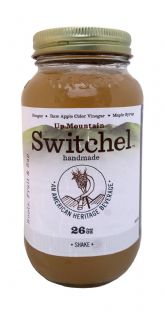
A recent article on Modern Farmer.com asks its readers a simple question: “Are you cool enough to drink switchel?” For those completely unfamiliar with the beverage, you’re not alone; it’s one that, until recently, hasn’t been widely consumed since colonial times.
Made with a blend of water, ginger, cider vinegar and a sweetening agent (current ready-to-drink varieties use maple syrup), drinking switchel is often a sweet and savory experience, and said to have a number of health benefits, including detoxifying and anti-inflammatory effects.
Over the past two years, a handful of bottled switchel brands have hit the market, including CideRoad, which is based in New Jersey, and one from Vermont simply known as “Switchel.” While Up Mountain Switchel was also founded in Vermont, the company recently moved its operations to the Bushwick neighborhood of Brooklyn, which has been tagged as the new entrepreneurial hub of New York City; in recent months, the area has been swarmed with early-stage food and beverage companies looking to make their mark.
Co-founded by Ely Key and Garrett Riffle, Modern Farmer describes Up Mountain Switchel as a brand that harkens back to the days when switchel was a thirst-quenching beverage for farmers during sweltering hay harvests.
Like the centuries-old consumers, Key and Riffle package the liquid in a mason jar, although the glass bottle plays up the stylish nature of the brand more than its functional use. The brand has caught on with the expected retail players, including farmers markets and Whole Foods stores, but it’s also carried in corner store bodegas in New York, where product variety is demanded and ubiquitous.

With the San Francisco Giants back in the World Series, Bay Area residents have once again been glued to their television sets in hopes of the team’s third title in five years. For Mike Bloomberg, the former mayor of New York and architect of an unsuccessful ban on large-format sugary drinks in the city, it’s the perfect opportunity to make his voice heard regarding Berkley, Calif.’s proposed soda tax, one that is up for a vote next week.
According to the San Francisco Gate, Bloomberg is spending at least $200,000 in baseball-themed television ads that urge Berkley voters to support Measure D, which would levy a one-cent per ounce tax on sugary beverages. One such ad features images of the Giants’ AT&T Park with a narrator stating that “The number of obese and overweight Bay Area children could fill our baseball stadium three times… But on Nov. 4, we get a chance to change the game.”
Roger Salazar, spokesman for the campaign against Berkeley’s beverage tax, said that the “ad proves that this has never been a local grassroots effort,” and characterized the effort as “the 1% pushing a tax on the 99%, and exempting themselves from it.
Ancient Isotonics
A blend of ash, vinegar and water doesn’t sound like the kind of sports drink that LeBron James might pound after an intense workout, but it was apparently the preferred beverage among some ancient gladiators.
As reported by Live Science, a recent analysis of skeletal remains of gladiators found in Turkey detected almost twice the ratio of strontium to calcium in their bones, suggested that the warriors had been drinking the aforementioned mixture, one that has been described in ancient texts. Ash, was a common ingredient for Romans who often used it as a food additive (for purposes of gaining a smoky flavor) and for medicinal use. The ash would have accounted for the added strontium found in the bones.
“They didn’t have coffee; they didn’t have tea,” study co-author Fabian Kanz, a forensic anthropologist at the Medical University of Vienna in Austria, told Live Science. “But they had wine, and then they drank a mixture of vinegar and water. It’s not as horrible as it sounds.”